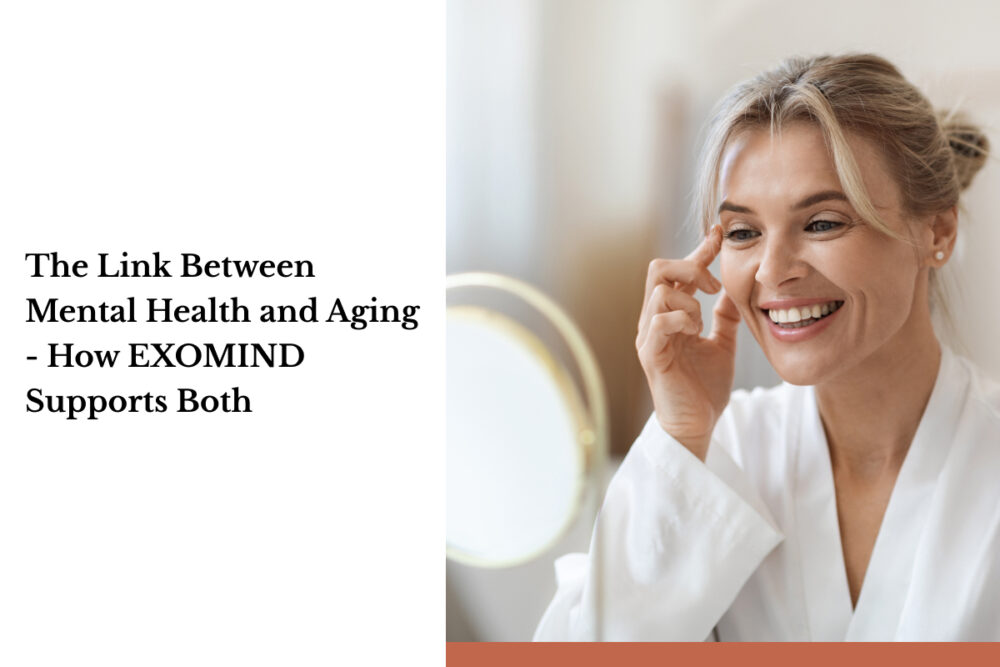Aging brings changes that we often notice in the body, from joint stiffness to lower energy, but the brain also shifts in ways that are just as important. Mental health plays a powerful role in how we experience aging, influencing memory, focus, mood, and overall resilience. Brain health, cognitive clarity, and emotional wellness are just as vital as physical fitness when it comes to living well at every stage of life.
While some slowing of processing speed or memory recall is natural, decline is not inevitable. By caring for mental wellness and supporting the brain’s ability to adapt, it is possible to stay sharp, manage stress more effectively, and maintain balance throughout the aging process.
Understanding the Connection
As we age, the brain’s ability to form and reorganize connections, called neuroplasticity, naturally slows. This can show up as brain fog, mental fatigue, or more difficulty bouncing back from stress.
The encouraging news is that many of these changes are influenced by lifestyle, nutrition, stress management, and social connection. Supporting brain health is not just about avoiding decline, but about creating the conditions for focus, energy, and emotional stability.
How Aging Can Affect the Brain
- Slower information processing, which can feel like mental fatigue
- Difficulty concentrating or experiencing brain fog more often
- Heightened stress responses or changes in mood balance
- Longer recovery from mental or physical exhaustion
Key Factors That Shape Brain Health
The choices we make each day have a powerful impact on how the brain ages.
Lifestyle and Nutrition
Movement, restorative sleep, and nutrient-rich foods all support brain wellness. Diets high in omega-3 fats, colorful fruits and vegetables, and antioxidants help protect neurons. Regular physical activity increases blood flow to the brain, improving focus and memory.
Stress and Mental Wellness
Chronic stress can intensify brain fog and mental fatigue. Mindfulness practices, breathing exercises, and regular downtime create space for recovery and improve emotional resilience.
Social Connection
Staying socially engaged is one of the strongest protective factors for brain health. Connecting with friends, joining community activities, or volunteering stimulates the mind and strengthens mood.
How EXOMIND Supports Mental Health and Aging
At Form Medical Aesthetics, EXOMIND™ is offered as part of a structured wellness program. It is designed to support the brain’s natural processes, encourage mental clarity, and promote resilience as part of healthy aging.
Targeted Support for Mental Wellness
EXOMIND helps clients focus on brain wellness by supporting balance, clarity, and adaptability. Many people describe improvements in focus, energy, and their ability to manage everyday stress.
Supporting Healthy Aging
Protecting brain health is a cornerstone of longevity. EXOMIND fits within a holistic plan that includes nutrition, exercise, and social connection, helping people feel sharper, more focused, and better equipped to age with vitality.
Everyday Habits for a Clearer Mind
While wellness programs like EXOMIND can play a role, the strongest results come from combining them with daily habits that strengthen the brain.
- Challenge your mind with learning, reading, or problem-solving activities
- Eat brain-friendly foods like leafy greens, berries, nuts, and fish
- Move your body through regular exercise or active hobbies
- Prioritize quality sleep and create time to recharge
- Stay socially connected with family, friends, or community groups
Caring for Your Present Self: Investing in Your Future
Brain fog, mental fatigue, and changes in mood do not have to define the aging process. Taking a proactive approach now can help you stay mentally sharp, emotionally resilient, and ready to enjoy life’s opportunities at every stage.
If you are ready to explore how EXOMIND can support your brain wellness and healthy aging, contact Form Medical Aesthetics today to learn more and book a consultation.

